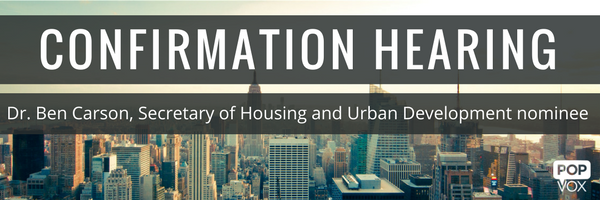This is a special view on the confirmation hearings provided by POPVOX interns from Brown University. We hope you enjoy and learn from their fresh perspective and front-row seat on Capitol Hill.
On Thursday, members of the Senate held a confirmation hearing for Dr. Ben Carson to be Secretary of Housing and Urban Development (HUD). A confirmation hearing is the first step the Senate undertakes in approving presidential nominations. If confirmed, Dr. Carson will lead HUD and serve on President-elect Trump’s cabinet.
 Wait, so what is a confirmation hearing?
Wait, so what is a confirmation hearing?
The Constitution requires the “advice and consent” of the Senate for Cabinet nominees. In order for a Cabinet nominee to be confirmed, they must go through a hearing with the relevant Senate committee. For the Secretary of Housing and Urban Development, it is the Senate Committee on Banking, Housing, and Urban Development. The committee votes on the nominee before going to the Senate floor for a full vote.
So who's on Senate Banking?
Senate Banking is chaired by Sen. Mike Crapo [R, ID], with Sen. Sherrod Brown [D, OH] as Ranking Member. There are 12 Republicans and 11 Democrats. See if your member is on Senate Banking.
So, what does the Department of Housing and Urban Development do?
HUD is in charge of housing policies and programs to ensure fair housing for all Americans, decrease homelessness, fight housing discrimination, and encourage fair lending practices. It oversees the programs that provide rental subsidies, create public housing, and insurance mortgages. If confirmed, Carson would oversee the scope, budget, and implementation of housing related programs and policies.
Who is Dr. Ben Carson?
Most people probably know Dr. Ben Carson from his presidential bid last year — his first foray into politics. Before deciding to run for office, Carson had a long career as a renowned neurosurgeon, most notably for performing the first surgery to separate twins conjoined at the head. Carson is one of several Trump picks without previous government experience.
What happened in the actual hearing?
Although calm compared to other hearings frequented by protesters, there was a long line by the time the hearing started. People staked out their spots for two and a half hours before, but with line holders saving spots for multiple people, the line tripled shortly before the hearing's start. The hearing was formal compared to other confirmation hearings. Carson took an oath of honesty, and Senate Banking Chair Mike Crapo explained the procedure, giving each senator five minutes to question Carson.
Sen. Marco Rubio [R, FL] introduced Ben Carson, highlighting Carson’s childhood in public housing and his strong desire to help others as qualifications for the position. Although the senators remained polite during questioning, there were clear distinctions between Democrats and Republicans regarding Carson’s ability to lead the department. While Republicans saw his outsider status as a benefit, Democrats saw it as a liability. The division reflected traditional ideological views on the role of government assistance, with conservatives advocating for smaller government, and liberals advocating for increased government assistance. Both parties, and Carson, agreed on the importance of removing lead from public housing to protect the health of residents.
The majority of Republican senators expressed confidence in Carson’s ability to lead HUD, and Sen. Richard Shelby [R, AL] even went as far to not ask any questions in the name of expediency. Ranking Member Sherrod Brown's opening remarks set the tone for the Democrats as he referenced previous quotes from Carson and his desire to cut funding for government programs by 10% across the board. Carson said his views had been distorted. He said social safety nets like rental subsidies are important but can foster dependency. He promised Sen. Brian Schatz [D, HI] he would advocate for the HUD budget.
When Sen. Brown pushed him on rising rent, he said the Department could attack it by lowering rent or raising wages, but quickly clarified he did not support a minimum wage. Instead, Carson insisted that developing talent would create a competitive economic environment where wages rose naturally. Most of the committee agreed on the importance of helping homeless veterans, and Carson said the programs could be enhanced.
Carson touted his idea for a listening tour across the country as a way to make HUD work better. He kept circling back to the idea of developing the talent of US citizens in a holistic way to be able to compete with India and China, but offered few specifics on how to do so aside from his desire to get the Department of Education and Department of Justice involved.
The most combative questioning came from Sen. Elizabeth Warren [D, MA] who asked Carson about President-elect Trump’s potential conflicts of interest. The Trump family has invested in subsidized housing, meaning they could benefit from HUD programs. Sen. Warren used her time to emphasize the importance of Trump putting his money in a blind trust. Sen. Brown later echoed this sentiment, and Carson agreed to create a process to notify the committee of any issues on Trump properties. The idea of public/private partnerships emerged again when Sen. Pat Toomey [R, PA] referenced the 2% to 17% increase of mortgages in the U.S. insured by the government — creating a high taxpayer liability. Carson advocated for a private sector solution. New member Sen. Catherine Cortez Masto [D, NV] took a second round of questioning to ask how people would be protected from private sector predatory lending that contributed to the 2008 housing crisis. Although Carson offered no specifics, he assured her that he wanted to avoid that as well.
Cool, I’m all caught up. What now?
The committee has until Tuesday to submit written questions to Carson. The committee will likely not vote on the nomination until after the Inauguration on January 20th. Use this time to tell your senators what you think!
Learn More:


